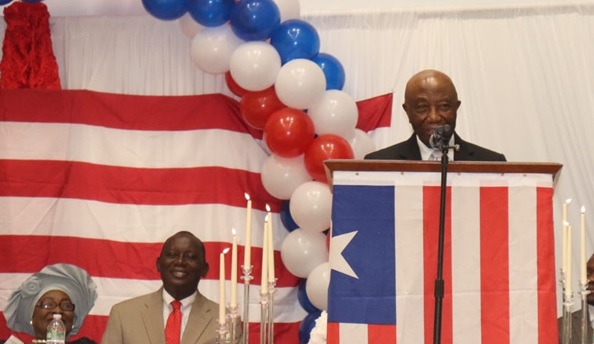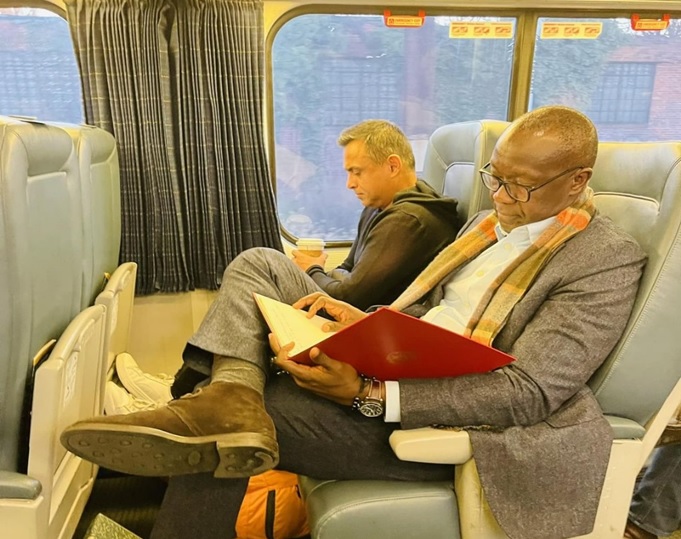PROVIDENCE, RHODE ISLAND, USA – Liberia’s President-elect Joseph N. Boakai (JNB), has hailed Liberians residing in the Diaspora, for being an integral part of those that rallied around him, in order for him to have sailed through what he described as a historic fashion in which Liberians expressed in Liberia’s recently concluded elections as to the change they desire.
In a speech delivered at Providence, Rhode Island, USA, on Saturday, 16 December 2023, at a formal welcoming ceremony by the JNB Movement, New England Chapter, and Liberian Communities in the Northeast, Mr. Boakai expressed appreciation and his deepest gratitude to the Liberian community in Rhode Island, and to all Liberian communities in the United States, Canada, the United Kingdom, and continental Europe, Africa, Asia, Australia, New Zealand, the Caribbean and several others for working jointly with Liberians at home in creating what he called a spontaneous people’s movement that brought about the undergirding of the country’s democracy.
“If this past campaign should make us strong and help prepare us for the tasks ahead, it would largely be on account of how the people of Liberia have rallied around us in a historic fashion for the change they want, and I must say, the Liberian Diaspora community has been an integral and crucial partner in all this,” said Boakai, adding; “Indeed, the Liberian community in Providence has been magnanimous!
The Liberian president-elect, who stated that he was in the U.S. to personally express his gratitude to Liberians in the Diaspora for their role in his victory at the polls on 14 November, in a presidential runoff election, thanked them for their financial and material donations, their expertise, media outreach, activism and their critical voices, which he said created awareness and popularized his campaign message for change, transformation, and rescue.
He used the occasion to recall that Liberia’s history for democracy and transformation has always had a link to the work of Diaspora communities, their organizations, and associations.
He observed that such Diaspora communities, their organizations and associations have in time past worked tirelessly to address some of the vexing issues confronting Liberia.
“I believe you invested in this process because you wanted a change in the political, social, economic, and material conditions that occasioned the steady stream of emigration, particularly in the last thirty years,” Boakai told his audience predominantly made up of Diaspora Liberians.
Saturday’s ceremony marked Boakai’s first public appearance for a period of a little over two weeks, amid speculations regarding a health scare of the president-elect.
Speculations were rife that Boakai, who flew to the U.S. almost immediately after the 14 November 2023 presidential runoff election, had gone for medical reasons, even though, a statement released by his political party, the Unity Party (UP) stated otherwise.
In reaction to rumors of a health scare regarding Boakai’s latest trip to the U.S., the incoming ruling UP informed the public that the president-elect had left the country to meet with family members and express gratitude to Liberians in the Diaspora for their role in the elections that gave him state power.
Howbeit, in his speech to Liberians in the Diaspora, Boakai emphasized the challenges ahead and highlighted the need to address what he called the crisis of governance in Liberia by promoting inclusivity and popular participation the decision-making process of his administration.
“I believe the power of government must come from the people, whose unfettered participation in the democratic process always establishes the legitimacy that ensures political stability and social cohesion,” he noted.
He added that the nature and structure of Liberia’s economy have promoted so much inequality and partly caused some of the social tensions and strains in the Liberian society that have led to conflicts.
“We must rethink how concession and enclave should work for our people across the entire value chain with deliberate decisions on value addition over raw extraction,” Boakai emphasized.
More than that, Boakai pointed out that the country’s natural resource exploitations must not only bring growth, but that that such growth must equally come with development, recommending that income is plowed back into the delivery of social services and other public goods.
“I also want to make the case for a productive economy, which is why I believe as a mainly agrarian country, Liberia must leverage its comparative advantage in agriculture to increase its economic output,” Boakai told the Diaspora Liberians, adding; “With sixty percent of the population made of youth and therefore its most productive cohort, and more than fifty percent of those working in the agriculture sector being women, we will ensure the critical investment needed in agriculture for agro-based production.”
He bemoaned the situation of the Liberian society being historically and unreasonably bedeviled by inequality with majority of Liberians being below the poverty line and at the lowest rungs of the social ladder.
He lamented that historical structural barriers have not only made it difficult, especially, for those in the rural parts of Liberia to access social services, adding that they have curtailed their ability to earn and sustain respectable livelihoods.
“These have created fault lines along wealth, class, ethnicity, and many more fractures that are the seeds of conflict,” noted Boakai, who was quick to point out that his administration may not remove these historical barriers overnight, averred; “but I believe we can manage them by empowering the people and providing opportunities and access to services.”
As for other social concerns such as the lack of respect for one another, dishonesty, hate messages, and the culture of impunity, Boakai assured Liberians in the Diaspora that during his reign, these anomalies will become things of the past in the Liberian society.
He then rallied Liberians both at home and abroad to join him as he leads in what he termed the fashion of a servant leader to help build Liberia together in order to promote a functional and equitable society for generations to come.







